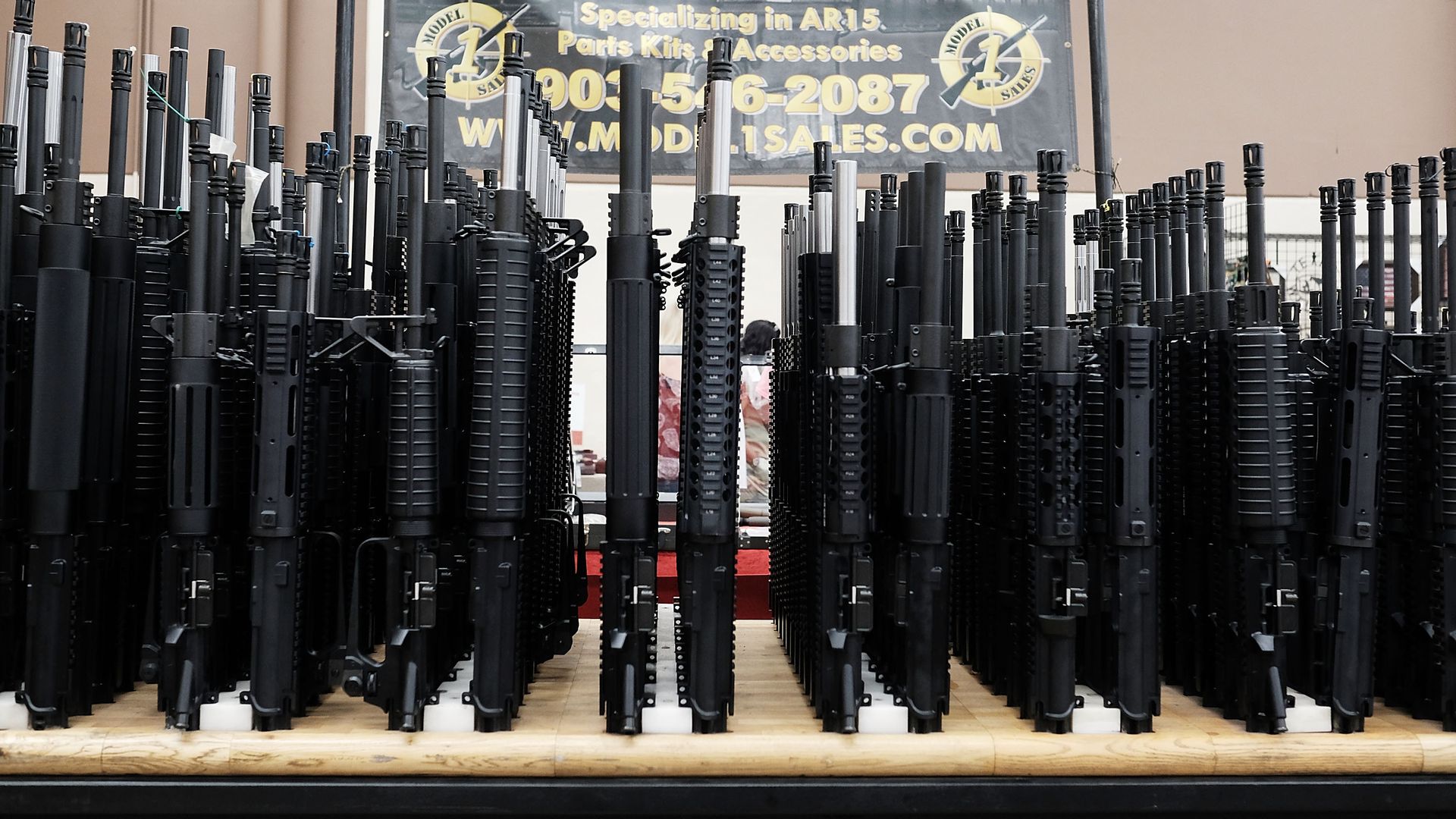Familiar lines drawn over assault weapons ban after Nashville shooting

Gun parts for sale at a gun show in 2016 in Fort Worth, Texas. Photo: Spencer Platt via Getty Images
The Nashville school shooting has reignited the gridlocked debate around a federal assault weapons ban, and familiar lines are being drawn by Democrats and Republicans.
Yes, but: The back-and-forth is unlikely to actually go anywhere, a reality that has dominated the issue of gun reform in the U.S. for more than a decade.
- There have been more mass shootings in 2023 than days this year.
What the 1994 assault weapons ban did
In 1994, President Clinton signed into law the Public Safety and Recreational Firearms Use Protection Act after it cleared Congress.
- The measure prohibited the manufacture, sale, and possession of specific military-style semiautomatic firearms and outlawed most large-capacity magazines capable of holding more than 10 rounds of ammunition.
- The law was designed to expire after 10 years and exempted weapons and magazines manufactured prior to the date it was signed.
- Sen. Dianne Feinstein (D-Calif.) pushed the legislation through Congress after a string of mass shootings committed with assault weapons, including the 1989 Cleveland Elementary School shooting in which a racially motivated gunman used a semiautomatic rifle to kill five children and injure 30 others, all predominantly Southeast Asian.
Why it has been gridlocked
After the law expired in 2004, there were multiple attempts to revive a ban, but none were able to move beyond partisan lines in Congress.
Yes, but: 63% of 18- to 29-year-old people in America support stricter gun laws, according to a March poll conducted by the Institute of Politics at Harvard Kennedy School.
- 58% also backed a ban on assault weapons.
What's happening now
The suspect who shot and killed six people, including three children, at The Covenant School in Nashville was armed with two “assault-type guns,” police said.
- “It's ripping our communities apart, ripping at the very soul of the nation,” President Biden said in remarks at a women's business summit Monday. “We have to do more to protect our schools so they aren't turned into prisons.”
- Biden, who helped secure passage of the 1994 assault weapons ban when he was chair of the Senate Judiciary Committee, reiterated Tuesday morning that Congress “has to act.”
- “I have gone the full extent of my executive authority to do, on my own, anything about guns,” he told reporters. “I can't do anything except plead with the Congress to act reasonably.”
State of play: Democrats have echoed Biden's calls to double down on gun reform, but also recognize the partisan lines drawn in the sand.
- “No one should pretend like we can’t choose to end this carnage. It’s our decision to let it continue,” tweeted Sen. Chris Murphy (D-Conn.).
- House Democrats are considering a procedural action to force a vote on gun reform, The Hill reports, but GOP lawmakers have shut down the idea of reopening discussions.
- “We're not going to fix it, criminals are going to be criminals,” Tennessee Rep. Tim Burchett (R) told ABC News.
The big picture: Nashville Police Chief John Drake said Tuesday that the suspect had legally purchased seven guns from five local gun stores. Three were found at The Covenant School.
- At least 57 people have died in 38 mass shootings in the U.S. so far in March alone, according to data from the Gun Violence Archive.
Other countries have restricted assault weapons
In the United Kingdom, a conservative government enacted gun control legislation to ban high-caliber pistols after a mass shooting at an elementary school killed 17 in 1996. Gun crimes have dropped significantly in the years since.
- Australia has similarly seen only a handful of mass shootings since the 1996 Port Arthur Massacre, which prompted the government to push through new laws that banned the sale and import of all automatic and semi-automatic rifles and shotguns.
- And in New Zealand, members of Parliament overwhelmingly backed a ban on military-style semi-automatic weapons and assault rifles following the Christchurch terror attack in 2019.






